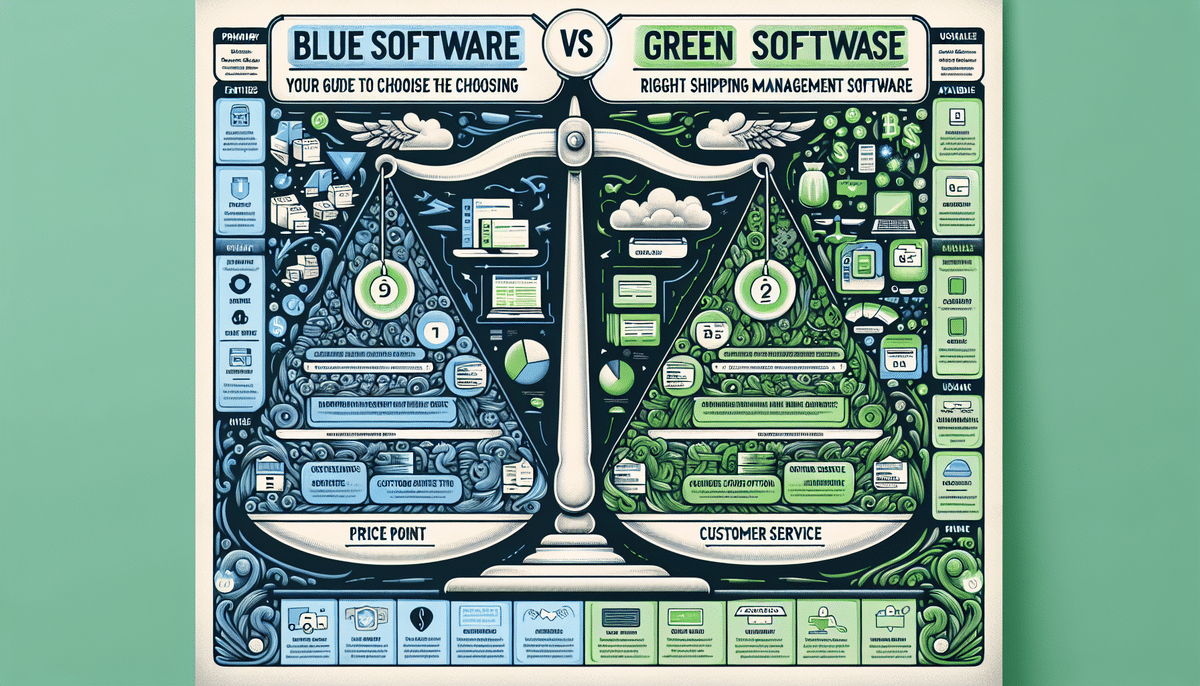Ordoro vs ShipStation: A Comprehensive Comparison
In the competitive world of e-commerce, efficient shipping and order management are vital for maintaining customer satisfaction and driving business growth. Ordoro and ShipStation are two prominent platforms that offer robust solutions for these needs. This article provides an in-depth comparison of their features, pricing, integrations, user interfaces, and more, helping you determine which platform best aligns with your business objectives.
Key Features and Functionality
Order Management
Both Ordoro and ShipStation offer comprehensive order management systems. Ordoro provides a centralized dashboard where businesses can track and manage orders seamlessly. ShipStation, on the other hand, excels with its automation capabilities, allowing for streamlined order processing and fulfillment through customizable workflows.
Inventory Management
Ordoro stands out with its advanced inventory management features, enabling businesses to monitor stock levels, set reorder points, and manage suppliers efficiently. ShipStation offers basic inventory tracking but relies more heavily on integrations with other inventory management systems for comprehensive control.
Automation and Customization
ShipStation offers extensive automation options, including automated shipping rules, label generation, and customer notifications. Ordoro also provides automation features but focuses more on simplifying processes through its intuitive interface. Customization options in ShipStation are more advanced, catering to businesses with specific workflow requirements.
Reporting and Analytics
ShipStation offers detailed analytics and reporting tools that provide insights into shipping performance, order history, and customer behaviors. Ordoro provides essential reporting features but lacks the depth found in ShipStation, making it suitable for businesses that require basic performance metrics.
Pricing and Plans
Choosing the right pricing plan is crucial for businesses of all sizes. Ordoro offers a tiered pricing model starting at $59/month, which scales based on the number of orders processed. This makes it a viable option for growing businesses that anticipate an increase in order volume. Additionally, Ordoro provides a free trial, allowing businesses to explore its features before committing.
ShipStation offers more flexible pricing plans, starting at $9/month for smaller businesses and scaling up based on the number of shipments. This flat-rate pricing structure can be cost-effective for businesses with fluctuating order volumes. ShipStation also offers a 30-day free trial, enabling businesses to evaluate its capabilities without initial investment.
For a detailed comparison of pricing, refer to the official pricing pages:
Integrations and Compatibility
Integration capabilities are essential for ensuring that your shipping and order management system works seamlessly with other tools you use. Ordoro integrates with major e-commerce platforms such as Shopify, WooCommerce, and BigCommerce. These native integrations facilitate smooth data flow between your online store and order management system.
ShipStation offers a broader range of integrations, including marketplaces like Amazon, eBay, and Etsy. Additionally, ShipStation supports integrations with various inventory and accounting software, providing a more versatile solution for businesses that use multiple platforms.
For a comprehensive list of integrations, visit:
User Interface and Ease of Use
The user interface (UI) plays a significant role in the usability of any software tool. Ordoro is praised for its clean and intuitive UI, making it easy for users to navigate through different features without a steep learning curve. This user-friendly design is particularly beneficial for small to medium-sized businesses that may not have dedicated technical support.
ShipStation offers a more feature-rich interface with extensive customization options. While this provides greater flexibility and control, it can be overwhelming for new users. ShipStation’s advanced features are better suited for larger businesses with complex shipping needs and the resources to manage a more intricate system.
Shipping Rates and Carrier Options
Shipping costs can significantly impact your overall profitability. Both Ordoro and ShipStation offer discounted shipping rates through major carriers like USPS, FedEx, and UPS. However, ShipStation extends its discounted rates to include DHL, providing more options for international shipping.
Ordoro offers a unique "Smart Shipping" feature that automatically selects the most cost-effective carrier and shipping method based on order weight, destination, and delivery requirements. This can help businesses minimize shipping costs without manual oversight.
ShipStation provides "Customized Views," allowing businesses to create filters and views that highlight the best shipping options for each order. This feature enhances the ability to quickly identify and select optimal shipping methods, improving overall efficiency.
For more details on shipping options and carrier partnerships:
Customer Support and Service
Reliable customer support is essential for resolving issues and maintaining smooth operations. Ordoro provides customer support through email and live chat during standard business hours. Their support team is known for being responsive and helpful, particularly for onboarding and troubleshooting common issues.
ShipStation offers more extensive support options, including 24/7 customer support via phone, email, and live chat. This round-the-clock service is advantageous for businesses operating in multiple time zones or those that require immediate assistance to minimize downtime.
Explore support options:
Security and Compliance
Data security and compliance with industry standards are critical for protecting sensitive information. Both Ordoro and ShipStation implement SSL encryption to secure data transmissions and adhere to strict security protocols.
ShipStation offers additional security features such as two-factor authentication (2FA) and IP address restrictions, enhancing account security and providing peace of mind for businesses handling large volumes of transactions.
Ordoro focuses on maintaining robust security measures, including regular security audits and compliance with data protection regulations, ensuring that your business data remains safe and secure.
Analytics and Reporting
Access to comprehensive analytics and reporting tools enables businesses to make data-driven decisions. ShipStation provides advanced reporting features that offer insights into shipping performance, order trends, and customer behaviors. These detailed reports help businesses identify areas for improvement and optimize their shipping strategies.
Ordoro offers essential reporting capabilities, allowing businesses to track key metrics such as order volume, shipping costs, and inventory levels. While not as detailed as ShipStation's offerings, these reports are sufficient for businesses that require basic performance tracking.
Learn more about their reporting features:
Scalability and Performance
As your business grows, your shipping and order management platform must scale accordingly. Ordoro is designed to support small to medium-sized businesses, providing the necessary tools to manage increasing order volumes efficiently. Its stable performance ensures that businesses can handle growth without sacrificing speed or reliability.
ShipStation caters to businesses of all sizes, from startups to large enterprises. Its robust automation features and extensive integrations make it highly scalable, allowing businesses to expand their operations seamlessly. ShipStation's performance remains reliable even as order volumes surge, making it a preferred choice for rapidly growing businesses.
Pros and Cons
Ordoro
- Pros:
- User-friendly interface
- Advanced inventory management
- Cost-effective pricing for growing businesses
- Smart Shipping feature for cost optimization
- Cons:
- Limited advanced automation compared to ShipStation
- Basic reporting features
ShipStation
- Pros:
- Extensive automation and customization options
- Broad range of integrations
- Advanced reporting and analytics
- 24/7 customer support
- Cons:
- Can be overwhelming for new users
- Pricing may be higher for small businesses with low order volumes
Conclusion: Choosing the Right Platform for Your Business
Both Ordoro and ShipStation offer robust solutions for shipping and order management, each with its unique strengths. Ordoro is ideal for small to medium-sized businesses that prioritize ease of use, advanced inventory management, and cost-effective pricing. Its intuitive interface and Smart Shipping feature make it a compelling choice for businesses looking to streamline their operations without extensive technical requirements.
ShipStation, on the other hand, is well-suited for businesses that require advanced customization, extensive automation, and a broad range of integrations. Its scalable architecture and comprehensive reporting tools make it an excellent choice for businesses anticipating significant growth and complex shipping needs.
Ultimately, the best choice depends on your specific business requirements, budget, and growth plans. Carefully assess each platform's features, pricing, and support to determine which aligns best with your operational goals.




















